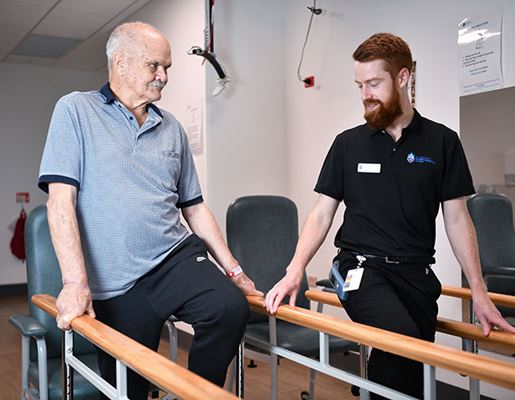Total Hip Replacement
- Home
- Services
- Orthopaedics
- Hip Orthopaedics
- Hip Replacement
- Total Hip Replacement
What is a total hip replacement?
Total hip replacement surgery, also known as hip replacement or hip arthroplasty, is an advanced technique that repairs your damaged hip joint using artificial parts. As one of the body’s largest weight-bearing joints, the hip is vulnerable to injury or disease particularly as we age. Hip replacement surgery is usually required to relieve pain caused by severe arthritis or injury.
During the procedure, the ball-shaped femoral head at the top of the thighbone is removed and replaced by an artificial ball and stem. This is implanted down into the thighbone. The damaged surface of the socket is also replaced, and a ceramic or plastic spacer is inserted between the ball and socket to facilitate a smooth and gliding movement.
Total hip replacement surgery is now one of the most common and successful types of joint surgery in Australia. It helps thousands of people regain mobility and improve their quality of life.
Is it right for me?
The decision to have hip replacement surgery is very personal and will depend on many factors. Although most patients tend to be older, recommendations are usually made based on the level of pain you are experiencing and how the condition is limiting your daily life. You may be suffering from stiffness, limping, swelling, a limited range of motion as well as ongoing pain. This can take an emotional toll and be difficult to deal with on a daily basis.
Surgery is usually the last option to consider, but if hip pain is left untreated it can worsen and cause other problems. Certain conditions such as osteoarthritis and rheumatoid arthritis can damage the cartilage to such an extent that replacement surgery becomes necessary.
In a situation where support such as pain relief, physiotherapy and walking aids has been ineffective over a period of time, your doctor may recommend a hip replacement as a beneficial alternative.
Preparation
Before undergoing the procedure, your doctor will undergo a thorough medical evaluation to ensure you're healthy enough for surgery and anaesthesia. Some medications may need adjustments or temporary discontinuation prior to surgery.
Follow up
Postoperative care often includes physical therapy to aid in recovery and improve mobility, pain management medications, and possibly blood thinners to prevent clot formation. Regular follow-up appointments with your orthopaedic surgeon are crucial to monitor the healing process and ensure the implant is functioning as intended.

Hip replacement approaches
Other hip surgeries
Total Hip Replacement FAQs

How much will my hip surgery cost?
Understanding the cost of your treatment is an important consideration before committing to surgery, but it’s not always easy to find the information you need. Learn more about the factors which contribute to the cost of your surgery:
What will my treatment and recovery look like?
Familiarising yourself with your treatment program and understanding the recovery process are important steps to take on the pathway to surgery.

Find a hospital with orthopaedic services
Our Hospitals



